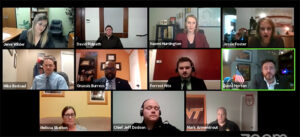
Radford Va city council meeting via Zoom & Facebook Livestream. Zoom meetings became common in March, 2020 as a way to stop the spread of coronavirus. Now that meetings are being held in person, much of the gain public access is being lost.
Imagine you’ve been assigned to write about a City Council meeting. There are a dozen speakers and a bunch of different issues. How do you decide what’s important?
First, be sure you have the following:
- Background — Who’s who — Be sure you know who the council members and staffers are. For instance: https://www.radfordva.gov/179/City-Council.
- Agenda — What’s what — Have the agenda handy in case you need to be more specific about ordinance numbers or the topics of public hearings. For instance: https://www.radfordva.gov/AgendaCenter/City-Council-2
Record the meeting. (Or find out where it is already recorded) Follow the meeting and take notes, along with time notations, so you can go back to your recording and get an exact quote if you need to. (Experienced reporters capture their direct quotes as they go along).
Write a lead. You’ll need to use your news judgement to decide which of the agenda items is most important. Sometimes, what is important to city officials is also what is important to your audience. If there is a well attended public hearing on a controversial new ordinance, that, obviously, is where you lead will focus. But sometimes the day-to-day work of government is too far down in the weeds for your audience. Think of what will matter to them. Example: If an engineer’s report says the football stadium lights are unstable, and could fall any time in a high wind, that would be a more important news item for your readers / audience than, say, how the city is negotiating a lower rate for a municipal bond, which is the kind of detailed work that we expect our city governments to do well, but without a lot of public input.
For a small city, the following list of typical items might help you prioritize, but, as always, common sense and experience will help you develop you own news judgement.
City council operations
- Proposals and votes about ordinances, budgets, hiring & firing of city officials
- Public hearings
- Discussions and presentation about public issues
- Closed non-public sessions (personnel, real estate or legal issues)
Priority issues for news coverage in a small city
- Human life, public health, environment and medicine (the pandemic, for example)
- Criminal justice, courts, law, police, public safety
- Elections and democratic politics
- Education, school board, libraries
- City finances & infrastructure (transportation, utilities, etc)
- Economic issues for the city’s business community
- Land use (parks, zoning) and long term planning
- Reports from and appointments to boards and commissions
Five “W”s and other news tips
- Your job is to summarize what happened in the public meeting. Be brief.
- Remember to consider the who, what, where, when, why and how.
- Stick to the main facts. Example:
- City Council voted yesterday to approve a new ordinance that would …
- Not: After the pledge of allegiance and a greeting from our wonderful mayor, city council tackled a couple of interesting things on their agenda that I thought were very interesting, including a new ordinance that would …
- Use at least two or three direct quotes to add life and color, high up in the story. These should come directly from city council members, staff or public comments made in the meetings, not just from a random observer.
- Don’t use quotes for everyday facts. Example: “The population of our city is 41,000,” the mayor said.
- Use quotes for opinions from people in the city council meetings. “With 41,000 people in the city, you’d think we would have a decent ice cream shop,” the mayor said.
- Use objective methods. Get the best quotes and information from all sides of all controversy.
- Be neutral. Don’t make editorial comments, even for obviously good or bad things. Quote other people making those comments.
- Avoid personal references and opinions. A news article is not the place to tell your readers / audience what you think.
- Follow up to make sure you have accurate spelling of speakers names and a good understanding of issues and resources for the public.
Structure your story
- Once you have a lead and color quotes up front, develop the information in your story in a logical way. Often you’ll need to have a paragraph that serves as a “roadmap.” Example:
- There are three possible futures for the hydro dam, city engineer Steve Smith said: Abandonment, status quo, or rebuilding. Each has their benefits and drawbacks… (Then use a paragraph or two for each possibility).
- You may need to add other information in the same story, and you’ll probably use a transitional paragraph. Example:
- “In other city council action, the mayor sent in a proposal for a new municipal swimming pool. “
Additional items and media
- Write a suggested headline and stand-first paragraph, along with pull quotes
- Take or obtain still photos, videos and audio, depending on what’s useful for your medium.
- Ask city officials for maps, graphs and other official slide shows. Usually they are glad to share.
MORE
- The Lead from Melvin Mencher’s News Reporting and Writing
- Purdue Online Writing Lab offers this basic advice for “How to Write a Lead“
- Politically partisan news is easier to read, research shows.
- Free speech or out of order? Public meetings grow contentious. (Washington Post, Jan 17, 2023).
